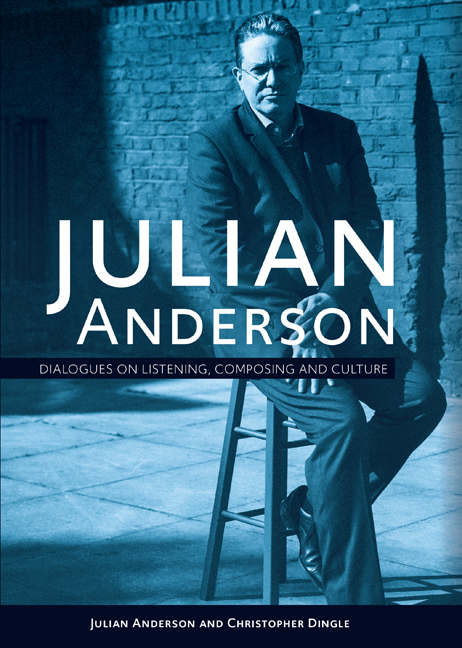Book contents
- Frontmatter
- Contents
- List of Illustrations
- Foreword
- Acknowledgements
- Introduction
- Prelude – Jeux: A Conversation Over Lunch
- Conversation One Origins
- Conversation Two Enthusiasms
- Conversation Three Training
- Conversation Four Dance
- Conversation Five Folk
- Conversation Six Composing (or Not)
- Conversation Seven Understandings
- Conversation Eight Beginnings (and Endings)
- Conversation Nine Puzzles
- Conversation Ten Singing
- Conversation Eleven Olly
- Conversation Twelve Memory
- Conversation Thirteen Opera
- Conversation Fourteen Practices
- Conversation Fifteen Outsiders?
- Conversation Sixteen Quartets
- Conversation Seventeen Advocacy
- Conversation Eighteen Partnerships
- Coda: Multiple Choices
- Chronology
- List of Personae
- Glossary of Musical Terms
- Macrotonality
- Catalogue of Published Works by Julian Anderson
- List of Recordings of Julian Anderson’s Music
- Bibliography
- Discography
- Index
Conversation Fifteen - Outsiders?
Published online by Cambridge University Press: 16 September 2020
- Frontmatter
- Contents
- List of Illustrations
- Foreword
- Acknowledgements
- Introduction
- Prelude – Jeux: A Conversation Over Lunch
- Conversation One Origins
- Conversation Two Enthusiasms
- Conversation Three Training
- Conversation Four Dance
- Conversation Five Folk
- Conversation Six Composing (or Not)
- Conversation Seven Understandings
- Conversation Eight Beginnings (and Endings)
- Conversation Nine Puzzles
- Conversation Ten Singing
- Conversation Eleven Olly
- Conversation Twelve Memory
- Conversation Thirteen Opera
- Conversation Fourteen Practices
- Conversation Fifteen Outsiders?
- Conversation Sixteen Quartets
- Conversation Seventeen Advocacy
- Conversation Eighteen Partnerships
- Coda: Multiple Choices
- Chronology
- List of Personae
- Glossary of Musical Terms
- Macrotonality
- Catalogue of Published Works by Julian Anderson
- List of Recordings of Julian Anderson’s Music
- Bibliography
- Discography
- Index
Summary
This conversation starts by looking at some of the outsider figures who have inspired Anderson, prompting an extended discussion of the violin concerto, In lieblicher Bläue. After that, Anderson reflects on his own position, leading to an exchange about composition as a communicative rather than isolating activity. In the last part, Anderson reveals how the open attitudes of his teachers, Lambert and Goehr, helped negotiate some of the more partisan approaches of others.
CD: Some of your works have been inspired by or even included material by figures who worked outside the circle of their contemporaries or even society as a whole, notably Hölderlin with your recent violin concerto, In lieblicher Bläue.
JA: In the last few years I’ve become aware that most of the writers to whom I seem attracted have a slightly oblique relationship to their period. Now they’re subsumed into the canon, as Hölderlin or Emily Dickinson have been. But during their lives they had distinctly odd relationships with their society.
CD: Do you find that people try to pigeonhole you in ways that are uncomfortable, or simply, at best are only partial and are restrictive?
JA: I don't know, I’ve never consciously thought that. I’ve been treated generously, for which I’m very grateful; I’m not in any way complaining. Perhaps in some circles in mainland Europe I may be seen in a different way. On the one hand, I’m known as somebody who has advocated spectral music quite a lot. After all, my first articles were published in French, not English, and were on that topic. They know of me in that connection, but they are also aware that my music doesn't fit into that category.
CD: In terms of the spectral influence, would you say it's less a strict technique and more a certain sensibility in terms of approaching sound? That it's opened up sound worlds for you, but there's no compulsion at all to follow any of the technical aspects of it?
JA: Yes, that's a brilliant way of putting it. In the case of my Violin Concerto, if you listen to certain sonorities, you would hear that I had been affected by discoveries in spectral music, but there's not a microtone in it.
- Type
- Chapter
- Information
- Julian AndersonDialogues on Listening, Composing and Culture, pp. 299 - 315Publisher: Boydell & BrewerPrint publication year: 2020

